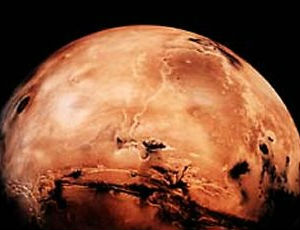With the film adaptation of The Martian (one of our picks for Best of the Best 2014) coming out October 1, here's a look at classic Red Planet reads.
Novels about Mars have increased by orders of magnitude since the early 1950s when Ray Bradbury published The Martian Chronicles. In Bradbury's seminal work, Man immigrates to Mars after thoroughly poisoning Earth. Mars is beautiful and serene, a good place for a fresh start, but humans bring their humanness with them. Easily succumbing to consumerism and the promise of comfort, they begin the tragic cycle over. Bradbury explores what makes us human in these connected stories by putting us in a foreign place, creating a modern classic.
The revered Dan Simmons writes of Mars as home to godlike creatures on Olympus Mons in Ilium. On a earthlike planet, the Trojan War is in its ninth year, and these creatures have resurrected various experts (such as Proust and Shakespeare) to report on the proceedings. Humans, in the meantime, live a peaceful, passive existence on Earth. Savi, the Wandering Jew, connects these worlds. Simmons also throws in a race of AI who become curious about the goings-on in the inner solar system. The book ends on a cliffhanger, to be resolved in Olympos, where earthlings fight for survival and the AI intervene to keep the solar system from being destroyed by quantum forces.
Red Mars by Kim Stanley Robinson is good, hard science fiction. This is the story of one hundred hardy souls of various specialties out to colonize the red planet. Their mission is to terraform Mars, releasing underground water and oxygen. The conflict is between those who consider this the next step in human evolution and those who consider it an ecological crime. Red Mars is the first in a trilogy including Green Mars and Blue Mars.
In Mars Life by Ben Bova, Jamie Waterman has discovered proof of a native civilization on Mars, destroyed 65 million years ago by a meteor. In fact, this civilization colonized Earth. This should be fascinating news and open the floodgates of funding to the Mars exploration colony to which Waterman belongs, but the United States is currently in the power of a religious fundamentalist movement, which is rabidly anti-science. This book, part of the Grand Tour series, includes hard science fiction with political intrigue.
The newest book in this collection by master Mars writers is by Brian Aldiss: Finches of Mars. Mars is colonized as a refuge from a warring, religion-obsessed Earth. The colonists would have more to be smug about if they could just keep the rations flowing and have viable offspring. However, Earth is more interested in its own problems, and the Martians will simply have to work it out themselves in this suspenseful tale. While perhaps not as well known as Ray Bradbury, Aldiss has won every major sci-fi award worth winning, and with what he has claimed will be his last book it is not hard to see why.




Add a comment to: Classics of Mars